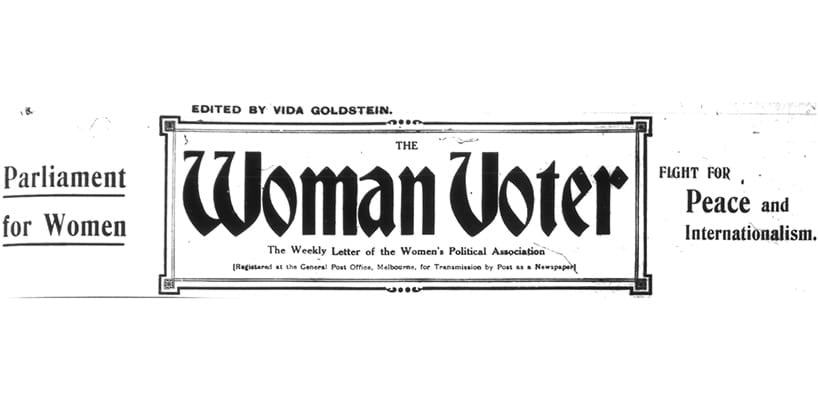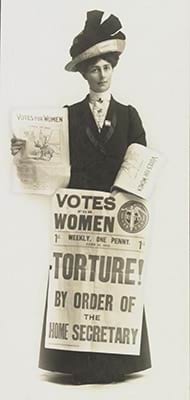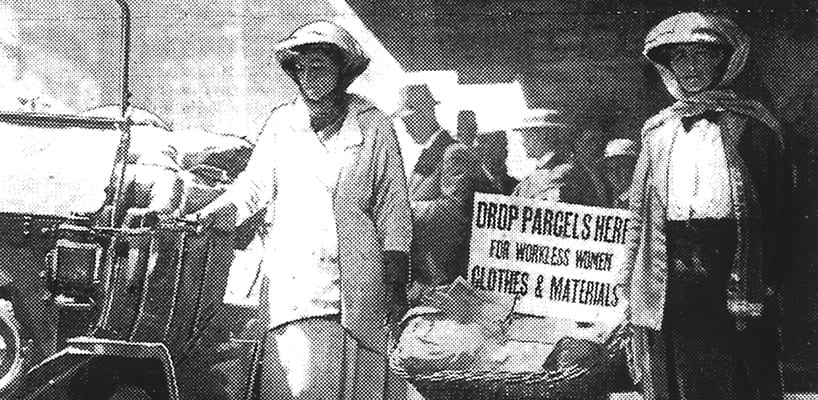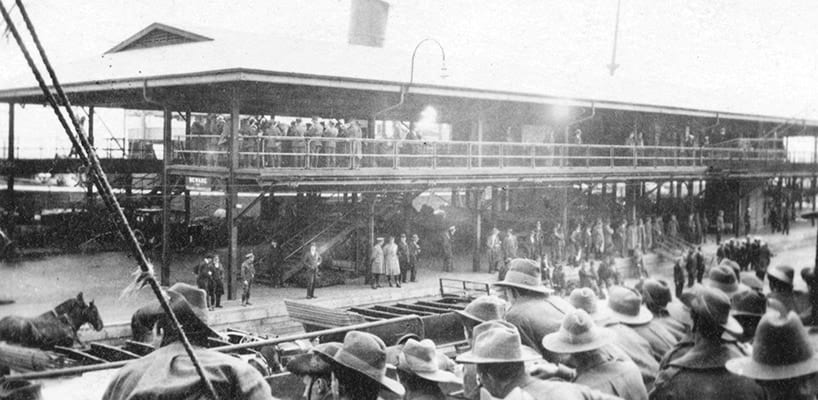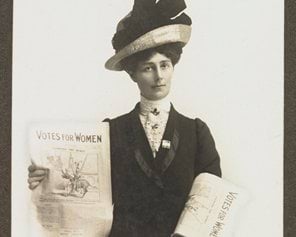
- Conflict:
- First World War (1914-18)
- Service:
- Women’s organisations
by Geraldine Robertson
When war was declared in 1914 women in the Women’s Political Association of Victoria (WPA) were prepared. They had recently won the right to vote and to stand for Parliament, so were keen to take their place in public life. On 4 August, the day the war commenced, they wrote in their journal, the Woman Voter:
This must be the last war between civilised peoples... The woman movement, which is growing in every nation will force upon Governments the necessity of finding other means of settling international disputes. It is awful enough that millions of men are standing face to face with violent death. It is more awful that all the rest of the people of the world are in danger of death by starvation.
4 August 1914
A week later, they continued:
Let us not be blinded by the excuse that this is a war for liberty. We shall curb one autocracy only to give power to another, still more dangerous, and we are fastening upon all the European workers a debt of countless millions, and a burden of famine and disease which war brings in its train... We may indeed crush Germany but are we then to see the end of military tyranny? [We may] crush German arms and exalt the power of a much more complete system of militarism and tyranny, that of Russia.
11 August 1914
They stated their position as follows:
This association protests against this war as an outrage on civilisation, and pledges itself to carry on a campaign of education in the interests of peace through arbitration.
5 October 1914
The WPA was accustomed to carrying on campaigns, including advocating for women’s rights, industrial equity and liquor reform, but now they combined peace activism with these social justice issues. They saw social injustice as a consequence of war:
WPA has decided to make an investigation into the conditions of distress caused by the war.
17 November 1914
The WPA organised public meetings and social events, and developed a system of education through writing, speaking and commercial media. They fought for civil liberty and freedom of the press. Censor staff told them their paper gave more trouble than any other Melbourne publication.
Our civil liberty and the freedom of the press are in jeopardy and we are prepared to fight for both... The blank pages in last week’s issue show that we have come under the ban of the military censor... We are told that we may publish anything that will ‘stimulate military enthusiasm,’ which is explained by the Military Journal as developing a ‘desire to kill.’
29 September 1914
We have been forbidden by the military authorities to sing or make use of the song ‘I didn’t raise my son to be a soldier.’ Needless to say, the women will still continue to sing it, if they feel so inclined.
23 December 1915
WE WAR AGAINST WAR! Melbourne 20 January 1916, Great Peace and Free Speech Demonstration, Yarra Bank, Sunday afternoon.
9 March 1916
The WPA protested the rising cost of living and profiteering, protested unemployment and worked to help unemployed women establish and run a women’s employment bureau, a women’s farming cooperative and a worker’s commune:
The WPA Women’s Employment Bureau therefore will attempt to organise the women workers in industries from which they themselves will draw the sole profit.
15 December 1914
There has developed a movement to place some of these women on the land on cooperative lines.
9 March 1915
Miss Cecilia John... [made] far reaching proposals for establishing a workers’ commune— otherwise the help given is only a disguised form of charity. [At the Guild Hall, Swanston Street] the commune provided; 30,000 meals, 6,500 haircuts, 30,000 clothing items, 2,000 pairs of boots, 200 cases illness or confinement cared for.
8 November 1917
In July 1915 Adela Pankhurst headed a delegation of around a hundred women who attempted to storm Federal Parliament House shouting ‘We Want Work. Adjourn the House’. The WPA organised five deputations that week:
Cost of living deputation to Parliament—the deputation to the State Parliament struck such terror into the hearts of members that the House adjourned nearly an hour and a half earlier than usual. Our brave legislatures!
8 July 1915
The WPA also supported soldiers:
The soldiers who go away are heroes; the wounded soldiers who return are a nuisance, to be bundled away to their homes, or to hospitals, or to other States, as quickly as possible, regardless of comfort, or provision of money or food.
29 July 1915
Miss Goldstein lent her car last Friday to convey wounded soldiers from Ballarat to the base hospital.
12 August 1915
The WPA worked to oppose ‘White Australia’ and conscription:
There are many Australians who have defended a ‘White Australia’ on economic grounds, without a thought of racial hatred, but their self-respect will no longer allow them to uphold the principle when we accept the aid of India and Japan in killing our white ‘enemies’... So here endeth the White Australia policy.
27 October 1914
The Women’s Peace Army is strenuously opposing conscription... Public meetings are being held... a demonstration will be held on Yarra Bank.
14 September 1916
They supported the 1915 Women’s Peace Conference at The Hague, developing and publishing their own terms of peace, and they exposed the harm to women and children caused by the British blockade of Germany. In 1919, they denounced the Versailles Terms of Peace and argued for a ‘constructive peace that would sow no seeds of bitterness and revenge’. A constructive peace that was not, in their view, about to happen:
Peace is dawning more brightly day by day, but the greatest mental alertness is required to distinguish even dimly between the true and the false propositions for a constructive peace. The false clamours so loudly that the still, small voice of Truth and Justice is apt to go unheeded... May we venture to prophesy? Democracy, of a kind, will triumph, but it will be of such a form that those who called most loudly for democracy will prefer before it the autocracy they seek, and seek rightly, to dethrone.
7 November 1918
When peace was declared it did not bring renewed hope:
The old order has not changed... The winning nations, in the person of their rulers, show that victory has poisoned them, put a dangerous virus in their veins... which, working its course, produces new wars. The map will be changed, that is all, and the balance of power readjusted. New animosities, like mushrooms, are being sown... The language and conduct of diplomacy are still to obtain, the powerful are still to hold, and the small and feeble to be subject. The defeated are to be degraded to the utmost in the unarming, crippled in opportunity, and mortgaged beyond reason.
22 May 1919
Peace has come. Let those who will celebrate it. Of peace I have little to say. It is unspeakable, what there is of it. We have saved the world from the Germans. Heaven send something to save the world from us. The home Government, through Mr Churchill, has quite frankly explained the necessity for preparing for perpetual war. We are at war, or warring in pretty well every quarter of the globe. We consign to starvation ... women, little children and old men—firmly refusing to end our war with them, even when the war with their men had ceased... We bomb defenceless towns from the air while our press is still yelling for the blood of those who transgressed international law and our gentle women and brave men bear these unnameable things with an equanimity in which can be detected not one quiver of protest. I wish, for my soul’s relief, that I could find two words that would express our damnable hypocrisy.
It was not only the WPA that was concerned. There is evidence that some returned soldiers, too, felt angry and betrayed. Many returned to unemployment, or worse, as Vida Goldstein reported from London in November 1919:
Soldiers everywhere, the workers everywhere are being roused to white heat by the failure of their Governments to do anything to meet the difficulties in which they are faced in finding employment, in finding decent housing, decent food, decent clothing, except at exorbitant prices that are rising daily.
While soldiers in Melbourne did not burn down a town hall in their frustration, as they did in London, there was violence. On 19 July 1919—the peace day that was observed throughout the British Empire—the march of the morning degenerated into riots in the afternoon, resulting in many injuries and the death of a returned soldier. One journalist from The Age reported it as the day when ‘peace gave way to war’.
The WPA seemed to find renewed hope in 1919. There was not enough money to pay for Vida’s return passage from the 1919 Zurich International Congress of Women or to keep the Woman Voter going, yet they spoke of the future with some confidence:
The present intention of the Association is to go into recess (not to vegetate, but to possess our souls); into what we shall then emerge, it doeth not yet appear. But we MUST not, DARE not, be idle.
In the same edition, they announced:
We have to notify subscribers and readers generally of this paper that with this issue this publication ceases... The Voter does not die, nor does perish the work that it has done, mostly by the pen of its editor, Miss Goldstein. Its voice has gone into many places of the earth, and its influence has been potent. It has been a trailblazer.
18 December 1919
The last words go to Vida Goldstein:
HMT Orsova, Nearing Suez, 28 April 1919: The Anzac sermon was preached by an army chaplain... He spoke feelingly of the social conditions that had killed soldiers before they entered the trenches. The evidence in the trenches of the terrible results of those social conditions had roused many men to the sense of their duty to their fellows, and made them resolve that when they returned to civil life they would do all in their power to right the wrongs under which their comrades had lived. The peoples, as well as the Governments, have sown the wind of misunderstanding and of hate and are reaping the whirlwind, and we must bring in the soft breezes of sweet reasonableness, of charity, of clarity, to the consideration of social and industrial problems.
18 December 1919
And her final editorial from the WPA, published 18 December 1919:
Whatever comes, there is nothing that will get us all out of the slough, soldiers and civilians alike, but addressing ourselves seriously to the arts of peace; strenuously developing the best within ourselves, and the rich capacities of this beautiful land of ours.
Author:
Geraldine is a documenter; she researches and records neglected stories of feminist social justice activism. Her work includes: Prejudice and reason: Some Australian women’s responses to war, Making peace: Stopping all that leads to war and Melbourne bloody Melbourne: The Peace Day that wasn’t. Her work can be found online at womensweb.com.au and in the State Library Victoria.
Updated
